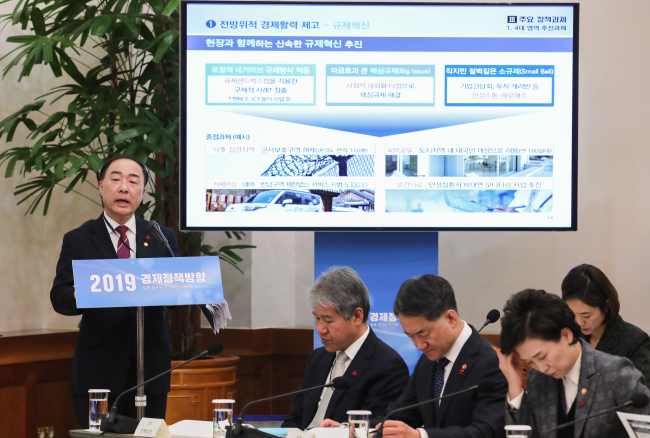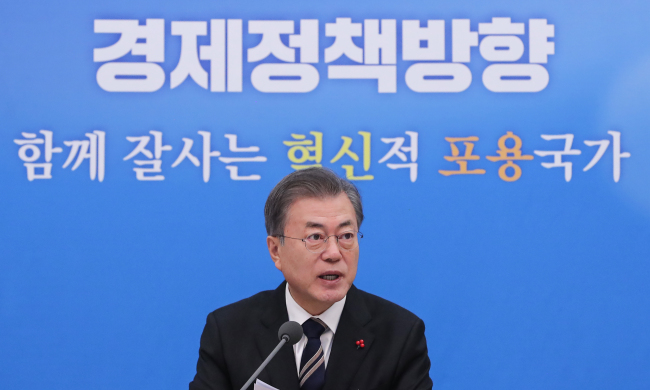S. Korea to slow down pace of wage hikes amid slow growth forecast
S. Korea’s growth rate set at 2.6-2.7% for 2018, 2019
By Bae HyunjungPublished : Dec. 17, 2018 - 17:04
The South Korean government on Monday set the country’s growth rate for next year at 2.6-2.7 percent, lowering its earlier forecast amid a slowing global economy.

It also indicated that it may slow down the pace of legal minimum wage hikes and the reduction of working hours in light of backlash from business circles and sluggish employment indexes.
“It is important that new economic policies such as the minimum wage hike and workhour cut are implemented under a public consensus based on the tolerance and harmony of interest groups,” said President Moon Jae-in at an extended meeting of economy-related ministers.
“We should work out ways to make adjustments (to policy directions), if necessary.”
“It is important that new economic policies such as the minimum wage hike and workhour cut are implemented under a public consensus based on the tolerance and harmony of interest groups,” said President Moon Jae-in at an extended meeting of economy-related ministers.
“We should work out ways to make adjustments (to policy directions), if necessary.”

The government will draft a revision bill by January to redefine the system of deciding wages and to expand the range of flexible working hours, with the aim of effectuating the alleviated rules by February, according to officials.
The comprehensive economic policy meeting, attended by new Deputy Prime Minister and Finance Minister Hong Nam-ki and other ministers, was the first of its kind since Moon took office in May 2017. It was also the first time that the state chief officially mentioned the possibility of slowing down the timeline of wage hikes.
Raising the hourly minimum wage to 10,000 won or more by 2020 has been a core goal of Moon’s “income-led growth” policy initiative.
The minimum wage was increased to 7,530 won ($6.70) in January this year, up 16.4 percent from the previous year, and it is set to climb to 8,350 won next year. The double-digit hike of the legal wage has frequently been cited as one of the reasons for lackluster employment.
However, the president maintained his drive for “inclusive growth,” calling for patience until current economic policies lead to visible outcomes.
“We are now in the process of changing the basis of our economic policies. While there may be disputes and questions along the way, it is crucial to wait with patience until (such efforts) bear fruit,” Moon said.
The president’s partial change of policy tone was seen as reflecting the latest forecast that the nation’s growth rate is likely to struggle throughout next year.
The Ministry of Economy and Finance on Monday forecast that this year’s growth rate would end at around 2.6-2.7 percent and that the figure for next year would likely remain in the same range. This was the second downward revision since the government in July slashed the yearly growth forecast to 2.9 percent from the previous 3 percent.
The International Monetary Fund and the Organization for Economic Cooperation and Development respectively suggested 2.6 percent and 2.8 percent for Seoul’s growth rate next year. While the Bank of Korea set its forecast at 2.7 percent, private think tanks such as Hyundai Research Institute and LG Economic Research Institute predicted 2.5 percent.
The number of newly employed people is expected to climb to 150,000 from this year’s 100,000, on the back of policy struggles in job creation, according to the ministry.
Seeking to overcome slow growth, the government presented a series of measures to stimulate the economy, focusing on support of the ailing manufacturing sector.
Having budgeted 469.6 trillion won for next year, the government vowed to allocate 61 percent of the amount to the first half of next year, in an effort to respond to the sluggish economy.
Under the fiscal-spending plan, the government will speed up the process of supporting corporate investments worth 6 trillion won, according to Finance Minister Hong.
“We shall expand investments by removing regulatory obstacles and increase investments by public institutions by 9.5 trillion won,” he said.
The government will also provide subsidies for core technologies related to electric and autonomous cars, seeking to increase the number of all-electric and hydrogen fuel-cell electric vehicles to 42,000 units and 4,000 respectively next year, up from 26,500 and 746 this year, the ministry said.
By Bae Hyun-jung (tellme@heraldcorp.com)








![[Graphic News] More Koreans say they plan long-distance trips this year](http://res.heraldm.com/phpwas/restmb_idxmake.php?idx=644&simg=/content/image/2024/04/17/20240417050828_0.gif&u=)
![[KH Explains] Hyundai's full hybrid edge to pay off amid slow transition to pure EVs](http://res.heraldm.com/phpwas/restmb_idxmake.php?idx=644&simg=/content/image/2024/04/18/20240418050645_0.jpg&u=20240419100350)





![[From the Scene] Monks, Buddhists hail return of remains of Buddhas](http://res.heraldm.com/phpwas/restmb_idxmake.php?idx=652&simg=/content/image/2024/04/19/20240419050617_0.jpg&u=20240419175937)

![[KH Explains] Hyundai's full hybrid edge to pay off amid slow transition to pure EVs](http://res.heraldm.com/phpwas/restmb_idxmake.php?idx=652&simg=/content/image/2024/04/18/20240418050645_0.jpg&u=20240419100350)

![[Today’s K-pop] Illit drops debut single remix](http://res.heraldm.com/phpwas/restmb_idxmake.php?idx=642&simg=/content/image/2024/04/19/20240419050612_0.jpg&u=)